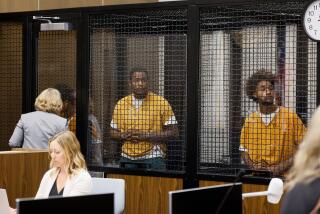Decades-old socialite slaying in L.A. makes its way to court
- Share via
On a spring night in 1974, three masked men wielding knives and guns and looking for cash burst into the West Hollywood hillside apartment of a young Australian socialite.
They left Patricia Galea, the daughter-in-law of a well-known Australian racehorse owner, fatally shot and five of her friends seriously injured by knife wounds.
The slaying made headlines in the U.S. and Australia, and Los Angeles County sheriff’s homicide detectives quickly identified two suspects -- two men who were friends with one of the victims.
But for various reasons, the killing remained an open case and eventually gathered dust. The two suspects served prison time for an unrelated murder in Michigan and were eventually released. The original detectives retired, and the case was largely forgotten.
Now, 36 years later, the slaying of Patricia Galea is finally going to court.
Cold-case detectives earlier this year presented a new case against the two alleged attackers, John Threlkeld, 55, and Leonard Turner, 62. L.A. prosecutors have charged them with murder, robbery and assault. They pleaded not guilty in a Beverly Hills courtroom, and Threlkeld’s attorney questioned the fairness of charging her client now.
“The fact of the matter is that 36 years ago . . . [detectives] could have pursued this case, and they didn’t,” attorney Mojgan Aghai said. “Why did it take them so long if they intended to pursue our clients? Why didn’t it happen a lot earlier? It’s impossible to defend yourself trying to reconstruct what happened.”
Lt. Michael Rosson, who oversaw the investigation, said he hopes the department can finally bring closure to the case that had fallen though the cracks.
Galea was married to the son of famed horseman Perce Galea when she arrived in Los Angeles in 1974 to open a Beverly Hills clothing business. She came to L.A. with $6,000 in cash, which she planned to use for the start-up.
Galea began socializing with several friends, including musician Eugene Synegal and Mercury Washington, a tailor who was helping her develop her clothing line. She moved into an upscale apartment that she shared with Synegal on Alta Loma Road near the Sunset Strip.
On April 14, she was scheduled to take a business trip to New Orleans with Washington. She went to Los Angeles International Airport but missed the flight.
According to detectives, Threlkeld, Turner and another suspect broke into the apartment while Galea was at the airport.
They allegedly tied up a friend who was house-sitting and ransacked the house, apparently looking for the $6,000.
Galea and several friends returned to the apartment and were attacked.
Prosecutors said Galea pleaded with her attackers, saying, “Please don’t kill me.” But one of the suspects put a shotgun to her mouth and pulled the trigger, authorities said.
Before fleeing, the attackers stabbed five people, including one woman who jumped out of a second-story window to escape.
Detectives quickly focused on Threlkeld and Turner after several witnesses said they believed the pair might have been involved. Threlkeld and Turner knew Washington, and authorities came to believe they somehow learned that Galea had the $6,000 in her apartment. (Officials stressed that Washington was not involved in the crime and was seriously hurt by the attackers.)
Three days after the killing, the Los Angeles County district attorney’s office filed an arrest warrant for the pair. By then, they were on the lam. They surfaced months later in Michigan, where they were arrested for an unrelated murder.
Threlkeld and Turner were tried and convicted in that case and sentenced to life without parole, according to Jane Robison, a spokeswoman for the district attorney’s office. Michigan authorities informed the L.A. district attorney that they were not going to send Threlkeld and Turner back to California because they were already serving life sentences.
But the murder conviction was overturned in the early 1980s, and the two were released.
It remains unclear why they did not immediately face charges in the Galea case.
“Somehow, somewhere, through this prosecution in Michigan, it got misfiled, misplaced or who knows. And this situation came about,” Lt. Rosson said. “It is not a situation that would come about today because of technology.”
Cold-case detectives picked up the case in 2007 and began a new investigation. They realized the original detectives already had suspects and began the process of reexamining the evidence.
“Homicide cases are never closed,” Rosson added. “There is nothing that, other than a conviction, would do that.”
More to Read
Sign up for Essential California
The most important California stories and recommendations in your inbox every morning.
You may occasionally receive promotional content from the Los Angeles Times.













